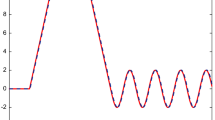Abstract
This paper deals with the fault detection problem for linear systems with unknown inputs. The H ∞ norm and H − index are employed to measure the robustness to unknown inputs and the sensitivity to faults, respectively. By using the pole assignment approach, the fault detection problem is transformed to an unconstrained optimization problem. With the aid of a gradient-based optimization approach, an explicit formula for designing the desirable observer gain is derived. Furthermore, the fault sensitivity over a finite frequency range can also be solved by the proposed method. The methodology proposed is verified through numerical simulation studies performed on the fault detection observer design of a vertical takeoff and landing aircraft.
Similar content being viewed by others
References
Wang, H.B., Wang, J.L., Lam, J.: An optimization approach for worst-case fault detection observer design. In: Proceedings of the 2004 American Control Conference, pp. 2475–2480. American Automatic Control Council, Boston (2004)
Ge, W., Fang, C.Z.: Detection of faulty components via robust observation. Int. J. Control 47, 581–599 (1988)
Patton, R.J., Frank, P.M., Clark, R.N.: Fault Diagnosis in Dynamic Systems: Theory and Applications. Prentice-Hall, London (1989)
Ding, X., Frank, P.M.: Fault detection via optimally robust detection filters. In: Proceedings of the 28th IEEE Conference on Decision and Control, vol. 2, pp. 1767–1772. IEEE, Tampa (1989)
Ding, X., Jeinsch, T., Frank, P.M., Ding, E.L.: A unified approach to the optimization of fault detection systems. Int. J. Adapt. Control Signal Process. 14, 725–745 (2000)
Hou, M., Patton, R.J.: An LMI approach to H −/H ∞ fault detection observers. In: Proceedings of the 1996 UKACC International Conference on Control, pp. 305–310. UKACC, Exeter (1996)
Wang, H.B., Lam, J.: Robust fault detection for uncertain discrete-time systems. J. Guid. Control Dyn. 25, 291–302 (2002)
Wang, H.B., Lam, J., Ding, X., Zhong, M.: Iterative LMI algorithms for fault detection with unknown inputs. J. Systems Control Eng. 219, 161–172 (2005)
Wang, H.B., Lam, J., Ding, X., Zhong, M.: An LMI approach for fault detection performance enhancement. In: Proceedings of the 2002 International Conference on Control and Automation, pp. 1238–1242. IEEE, Xiamen (2002)
Zhong, M., Ding, X., Lam, J., Wang, H.B.: An LMI approach to design robust fault detection filter for uncertain LTI systems. Automatica 39, 543–550 (2003)
Tyler, M.L.: Optimal and robust design of integrated control and diagnostic modules. In: Proceedings of the 1994 American Control Conference, pp. 2060–2064. American Automatic Control Council, Baltimore (1994)
Rank, M.L., Niemann, H.: Norm-based design of fault detectors. Int. J. Control 72, 773–783 (1999)
Liu, J., Wang, J.L., Yang, G.H.: Worst-case fault detection observer design: an LMI approach. In: Proceedings of the 2002 International Conference on Control and Automation, pp. 1243–1247. IEEE, Xiamen (2002)
Liu, J., Wang, J.L., Yang, G.H.: An LMI approach to worst-case analysis for fault detection observers. In: Proceedings of the 2003 American Control Conference, pp. 2985–2990. American Automatic Control Council, Denver (2003)
Liu, J., Wang, J.L., Yang, G.H.: An LMI approach to minimum sensitivity analysis with application to fault detection. Automatica 41, 1995–2004 (2005)
Wang, H.B., Wang, J.L., Liu, J., Lam, J.: Iterative LMI approach for robust fault detection observer design. In: Proceedings of the 42th IEEE Conference on Decision and Control, pp. 1974–1979. IEEE, Maui (2003)
Hu, T., Lin, Z., Lam, J.: A unified gradient approach to performance optimization under pole assignment constraint. In: Proceedings of the 2002 International Conference on Control and Automation, pp. 1368–1372. IEEE, Xiamen (2002)
Saif, M., Guan, Y.: A new approach to robust fault detection and identification. IEEE Trans. Aerosp. Electron. Systems 29, 685–695 (1993)
Narendra, K., Tripathi, S.S.: Identification and optimization of aircraft dynamics. J. Aircr. 10, 193–199 (1973)
Xiong, Y., Saif, M.: Robust fault isolation observer design. In: Proceedings of the 1999 American Control Conference, pp. 2077–2081. American Automatic Control Council, San Diego (1999)
Author information
Authors and Affiliations
Corresponding author
Additional information
Communicated by M.J. Balas
This work was supported in part by DSO National Laboratories under Grant DSOCL-01144, by Nanyang Technological University under Grant RGM 34/01, and by HKU CRCG 10204304. Part of this work was presented in 2004 American Control Conference [1].
Rights and permissions
About this article
Cite this article
Wang, H.B., Wang, J.L. & Lam, J. Worst-Case Fault Detection Observer Design: Optimization Approach. J Optim Theory Appl 132, 475–491 (2007). https://doi.org/10.1007/s10957-007-9183-3
Published:
Issue Date:
DOI: https://doi.org/10.1007/s10957-007-9183-3




